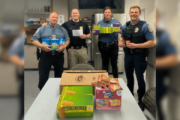PETE YOST
Associated Press
WASHINGTON (AP) — Prosecutors say a witness in the criminal case against four former Blackwater Worldwide security guards gave misleading testimony to a grand jury investigating the 2007 Baghdad shooting that killed 14 Iraqi civilians and injured at least 18 others.
In response to the disclosure, U.S. District Judge Royce Lamberth has demanded a written explanation of why the U.S. attorney’s office handling the case did not immediately notify lawyers for the Blackwater guards facing trial of evidence that could be useful in their defense.
The questioned testimony came from former Blackwater guard Jimmy Watson, who is expected to be a witness, possibly for both sides, in the criminal trial scheduled to begin June 11. Watson testified before the grand jury last year.
On Friday, Watson’s attorney, Preston Burton, declined to comment.
Four of Watson’s former colleagues face charges in the 7-year-old shootings that took place at Nisoor Square.
In a pretrial court proceeding Thursday, prosecutors disclosed that Watson felt responsible for the shootings because he had disregarded a directive not to move his convoy of Blackwater guards out of the protected Green Zone on Sept. 16, 2007. Remaining in that zone would have kept the convoy away from Nisoor Square, where the shootings took place.
Prosecutor Christopher Kavanaugh said Watson tried to assume some of the responsibility by incorrectly testifying that when he and the other guards got to Nisoor Square, he fired 60 shots and launched two grenades. Kavanaugh said Watson “embellished” his testimony by overstating his role in the shootings.
The evidence regarding Watson should have been turned over to the defense, attorney David Schertler told the court. Schertler is representing one of the four Blackwater defendants, Dustin Heard.
The seriousness of giving misleading testimony to a grand jury is underscored by the fact that Watson had been granted immunity from prosecution for his grand jury testimony. An immunity grant means that a person’s testimony cannot be used to prosecute that person. However, an immunized witness is obligated to give truthful testimony and can face prosecution for providing false testimony.
Despite the government’s obligation to turn over evidence that might be helpful, Watson’s testimony could wind up hurting the defense.
In a court filing last week, the prosecution said Watson will testify that insurgents were present in Nisoor Square, an assertion that would be helpful to the Blackwater guards who have maintained that they were fired upon and acted in self-defense.
However, prosecutors say evidence that Watson’s convoy moved in violation of an order tends to show that Watson’s testimony that insurgents were present is less probable and calls his testimony into question.
“If it became known that Watson and his team not only engaged in an unjustified shooting, but even worse, that the shooting occurred after Watson had violated a direct order not to leave the Green Zone, the consequences — both professional and personal — for Watson and his teammates would be dire,” stated the prosecution’s court filing. “Under those circumstances, Watson had little choice but to falsely claim that insurgents were present.”
The prosecution says evidence at trial will establish that the defendants were aware of the order to remain in the Green Zone. The defense says the opposite.
Watson’s team was on guard to help secure the safe return of another Blackwater convoy transporting a U.S. official who had been near the scene of a car bomb blast.
Copyright 2014 The Associated Press. All rights reserved. This material may not be published, broadcast, rewritten or redistributed.







